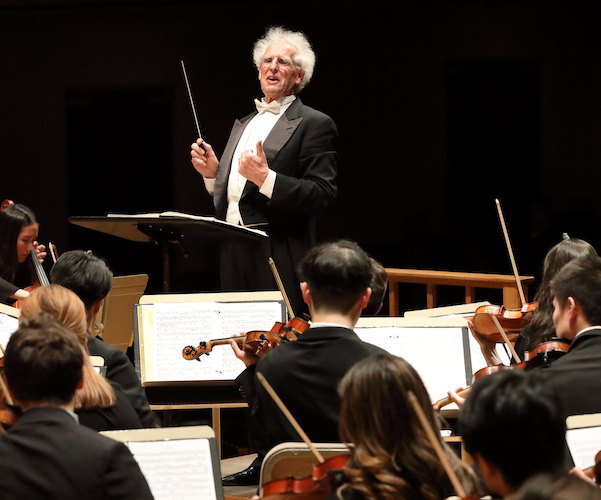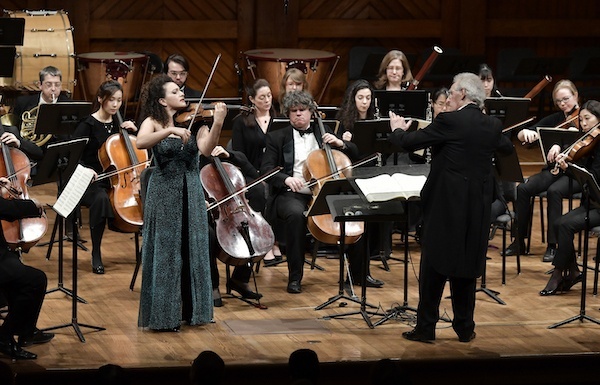Classical Music Preview: Catching Up and Looking Ahead with Benjamin Zander on the BPO/BPYO Season
By Jonathan Blumhofer
For Benjamin Zander and his musicians – as for all of us – it was a strange, even desperate, several months.

Conductor Benjamin Zander in action. Photo: Hilary Scott.
Benjamin Zander is ready to go. After being largely homebound since March 2020, the irrepressible founder and conductor of the Boston Philharmonic (BPO) and Boston Philharmonic Youth Orchestras (BPYO) can’t wait to return to the concert hall.
“Usually, I’m constantly travelling,” Zander noted as we recently chatted in his still-verdant Cambridge backyard. “But, in more than a year, I’ve hardly left home – not even to go to the store.”
Even so, he’s not been content to sit quietly.
Quite the opposite. Zander has spent much the last year-and-a-half teaching and coaching, mostly over Zoom, to interested parties near and far. (“One of my students wrote that you can take a conducting lesson with any conductor in the world, even in your pajamas!” he observed with a laugh.) As a result, his global reach may have even grown: recently Zander addressed a music educators podcast with a worldwide audience of over 300,000.
None of this, he noted ironically, would have happened if not for the pandemic: “These are things I never would have even thought to do otherwise.”
Closer to home, there’s been a major redesign of Zander’s website, with its extensive collection of audio and video recordings: concerts, masterclasses, chamber music coaching sessions, and the like. And, last fall, he had to overcome a serious leg injury.
He’s fully recovered from the last – but even without it, the man Sir Simon Rattle once dubbed “the world’s oldest teenager” (Zander’s now a spry eighty-two) has had a conspicuously full few months.
Of course, this news won’t surprise anyone who knows Zander or is familiar with his Weltanschauung. He thrives on creative problem-solving – after all, he and his former wife, Rosamund Stone Zander, collaborated on a best-seller on the subject – and the last year-plus has provided plenty of opportunity for rethinking old ways of doing things.
Indeed, the challenges have been out-of-the-ordinary.
It was the BPYO that had the last word in local live orchestral performance on 12 March 2020, playing Stravinsky and Berlioz for an audience of family and friends at Symphony Hall the night before the state went into lockdown.
After that, cancellation compounded cancellation. First, the remainder of the BPO’s and BPYO’s 2019-20 seasons were canned. Then a projected tour for the youth orchestra to South Africa was axed; after that came the scrapping of both ensembles’ 2020-21 seasons.
For Zander and his musicians – as for all of us – it was a strange, even desperate, several months.
Unlike the Boston Symphony, which is in operation year-round and boasts a robust endowment, the BPO presents only four programs each season and has a leaner financial cushion on which to fall back. Even so, through the generosity of its Board of Directors and numerous donors, in July 2020 the orchestra established a Musician Assistance Fund to provide financial aid to its members and teaching artists; as of mid-summer 2021, over $400,000 had been distributed to fifty-one BPO musicians.
During the summer months, too, Zander instituted a series of chamber concerts in his driveway that involved members of his orchestra as well as local players looking for gigs. Livestreamed on his Facebook page, they drew a healthy in-person following, as well.
With the BPYO, the situation likewise demanded an innovative solution. Its membership hails from Maine to New York and, with in-person gathering impossible, the options were stark: either somehow go remote or suspend the ensemble for the season.
Zander opted for the former. Once live performance was clearly an impossibility, he said, “I came up with this idea, which I think is one of the most fruitful ideas. I said, ‘The one thing we can all do without sound is conducting. So, you’re all conductors!’”
Thereupon, Zander and members of the orchestra, who range in age from 12 to 21, proceeded to spend their two-and-a-half-hour Saturday rehearsal blocks together studying Gustav Mahler’s Fourth Symphony on Zoom. It was a voluntary undertaking – “this is a very hard thing to do and I didn’t want to impose it on anybody,” he explained – but more than fifty of the ensemble’s 100 players stuck with the process for the full twenty-six weeks, from September to May.
Evidently, the curriculum – in addition to the piece, they studied instruments, orchestration, language, philosophy, leadership (“everything a conductor would need to know,” as Zander put it) – is paying dividends now that the group has begun rehearsing again. “There’s a new atmosphere in the orchestra,” he told me, “because they’re listening in a new way because they’re thinking of themselves as conductors.”
Local audiences will have a chance to hear this for themselves when the BPYO returns to Symphony Hall on November 19. The culminating piece on that program? Mahler’s Fourth Symphony.
Before that, though, come the first concerts in nineteen months for the BPO.
In a change from past practice, this year each of the BPO’s programs are being presented just once, rather than as a series of three concerts. Also, they’re all taking place at Symphony Hall (rather than being split between Jordan Hall and Sanders Theater).
“The big thing was the news that we’re playing all the concerts [there],” Zander said. “When I heard that we were in Symphony Hall, the obvious piece to play is Beethoven’s Fifth – or something like that to bring everyone in. But that’s what all the other orchestras are going to do. So I said, ‘No – let’s do [Anton] Bruckner’s Eighth!’”
Zander’s a longtime champion of the Austrian symphonist. In fact, he’s receiving the Bruckner Society of America’s Julio Kilyeni Medal of Honor – an award that puts him in the company of John Barbirolli, Georg Szell, Bernard Haitink, Otto Klemperer, and Arturo Toscanini, among other luminaries – before the BPO’s season-opening concert on October 15. Fittingly, his enthusiasm for the composer knows no bounds.
“It is one of the absolute pinnacle pieces – maybe one of the two or three greatest symphonic works ever written,” Zander said of the Eighth Symphony. “It’s a very hard work, like climbing an enormous mountain. There’s a lot of, ‘Are we there? Are we there?’ But, finally, the view is just unbelievably beautiful.”
One of the Symphony’s challenges is its immense scope. Its four movements last around eighty minutes but the expressive weight comes in the last two: the third is a massive, transcendent Adagio while the finale’s blazing chorales are both heaven-storming and, at times, slightly apocalyptic.
This presents a range of challenges, both interpretive and physical. Stamina – for conductor, orchestra, and audience – is a necessity. And that makes Bruckner’s Eighth perhaps a curious choice for an orchestra returning from an extended hiatus, especially one hoping to fill 2000+ seats in Symphony Hall.
Regardless, Zander’s optimistic.
“It turns out there’re a lot of Bruckner fans out there,” he said. “I was actually talking to someone yesterday who’s flying in from Las Vegas for the performance…and the reason is, the piece is so rarely played. Did you know that the last time [the Boston Symphony] played the Eighth was nearly twenty-five years ago [in 1998]?”
What’s more, the BPO’s ready to scale the Eighth’s musical heights.
“The orchestra’s very excited. They’re sick and tired of playing the Beethoven Fifth,” Zander relayed with, perhaps, a touch of hyperbole. “Even the Eroica. And Bruckner lets us bring everyone together. We’ve got three harps” – he noted with glee – “I’ve never seen it with three harps. [Bruckner] asks for three harps. I’ve done it with one harp and two harps, but never with three!”
If all goes according to plan, then, Zander expects the October 15th concert to be one of the highlights of the Boston-area classical season. Despite the different venue, the conductor will continue his invaluable practice of introducing the night’s music in a pre-concert lecture, this time from the stage of Symphony Hall.

Violinist Liza Ferschtman performing with the Boston Philharmonic Orchestra. Photo: Paul Marotta.
Looking ahead from the Bruckner, Stefan Jackiw joins the BPO as the soloist in Prokofiev’s Violin Concerto no. 2. This second concert, on November 10, also includes Mendelssohn’s Hebrides Overture and Zander’s seventh local performance of Brahms’s autumnal Symphony no. 4.
And it turns out Zander and the BPO aren’t anti-Eroica, after all: Beethoven’s Symphony no. 3 is paired with Dmitri Shostakovich’s Cello Concerto no. 1 (featuring Romanian cellist Andrei Ionita) on their third concert, on February 6.
Capping off the BPO’s year is another monumental score – Mahler’s Third Symphony – on April 8, in which they’re joined by mezzo-soprano Susan Platts and Chorus Pro Musica.
As for the BPYO, their November Mahler Fourth Symphony (which features the Boston debut of soprano Sofia Fomina in its finale and is paired with Samuel Barber’s Adagio for Strings and Mozart’s Haffner Symphony) is followed by a pair of warhorses: Shostakovich’s Symphony no. 5 on February 27 and Tchaikovsky’s Pathétique Symphony on May 6.
The latter pair are being played in anticipation of the ensemble’s season-ending tour, which, this time, is slated to take them to Russia, Berlin, and Prague. Partly the result of a serendipitous meeting between Zander and the conductor Valery Gergiev shortly before the beginning of the pandemic, the trip’s details have yet to be finalized – “right now, everything’s set in Jell-O, not stone,” Zander explained with a laugh – but are expected to included Tchaikovsky Cello Competition-winner Zlatomir Fung playing Elgar’s Cello Concerto (which he’ll do on the February 27 program; Alexander Korsantia appears in Prokofiev’s Piano Concerto no. 3 on the May BPYO concert).
It makes for an intense, busy season for Zander and both of his ensembles. They’re ready for it, though.
While some of the conveniences afforded by remote meetings these last eighteen months are real, Zander noted that they don’t replace the necessarily communal aspects of musical performance. Indeed, he noted pointedly, “the one thing you can’t do over a computer is make music together.”
Now, for the conductor, his philharmonics, and the rest of us, the time for live music has finally returned.
Jonathan Blumhofer is a composer and violist who has been active in the greater Boston area since 2004. His music has received numerous awards and been performed by various ensembles, including the American Composers Orchestra, Kiev Philharmonic, Camerata Chicago, Xanthos Ensemble, and Juventas New Music Group. Since receiving his doctorate from Boston University in 2010, Jon has taught at Clark University, Worcester Polytechnic Institute, and online for the University of Phoenix, in addition to writing music criticism for the Worcester Telegram & Gazette.
Tagged: Benjamin-Zander, Boston Philharmonic Youth Orchestras

It is not surprising that the BSO has not touched the Bruckner 8th in 25 years. The Orchestra’s DNA lies elsewhere (eg. Shostakovich) and its music directors, apart from Leinsdorf and Steinberg, have not been Bruckner champions. And, more generally, Bruckner is still not very “popular” in the US. Part of the reason is that even among conductors who perform it at all, there is a dearth of commitment and understanding. And, finally, it’s very difficult for any orchestra to play and sound well in doing so. The best Bruckner 8ths in Boston have come from Tennstedt (BSO ca. 1974) and Zander (BPO).
I am so glad that Mr. Zander will soon be back in action. His interpretation classes have been such an inspiration for me to get back into my own music. Although not a pipe organ, the instrument I studied, my Casio Workstation can do some amazing things!